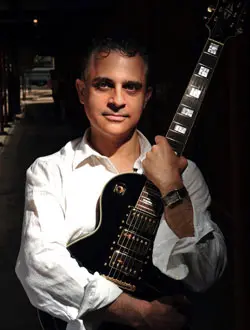

Accepted Students ONLY!
Join us Saturday, March 28 (10 AM–2 PM) for Go Big BLUE DAY — sessions, tours, and giveaways.
Sign Up Today!


Legendary guitarist Jimi Hendrix - and the revolutionary style he forged during the turbulent 1960s - will be explored at a lecture/demonstration on Saturday, Nov. 5, by Dr. Thomas Millioto, a Fredonia graduate who teaches and performs in New York City.
The free presentation, sponsored by the Fredonia Guitar Society, is at 2 p.m. in Mason Hall Room 1080, and the public is invited to attend.
Topics to be covered will include the following: main contributions to the evolution of the guitar, influences, technique, musical choices and the synergy between musical choices and gear choices. Some familiarity with the music of Mr. Hendrix and with general music theory will be helpful for attendees to have.
From an unusual vantage point, Dr. Millioto, will approach Hendrix’s music “with equal parts experienced guitarist and recordist.” Millioto was an award-winning adjunct assistant professor at CUNY Hunter College, Manhattan, taught guitar at Brooklyn-Queens Conservatory of Music and continues to work in film, television, web and music production, in addition to performing and teaching guitar privately.
“I find that many classical and jazz guitarists don't seem to understand what Jimi was doing sonically. I also find that many rock players who can appreciate Jimi's sonic palette, don't have the tools to appreciate the depth of his musical thinking, because his music was heavily influenced by the blues, R&B, funk, jazz and other types of music that rock players usually don’t hear these days. So, this is really just a way to begin to set the record, and the dialogue surrounding Hendrix's work, straight,” he said.
Hendrix, whose mainstream career spanned only four years, formed the Jimi Hendrix Experience in 1966. Hendrix headlined the Woodstock Music and Art Fair, and Rolling Stone ranked its three studio albums – “Are You Experienced,” “Axis: Bold as Love” and “Electric Ladyland” – among the 100 greatest albums of all time.
Though Millioto will speak of Hendrix purely as a guitarist, he acknowledges many other layers or dimensions of the musician. Hendrix, who died in 1970 at the age of 27, was an artistic force who rode the wave of a cultural movement he helped create, and is now regarded as one of the greatest artists of the 20th century, Millioto said.
Millioto’s perspective has been shaped by his classical training (B.A. in Classical Guitar Performance and Sound Recording Technology at Fredonia, M.M. and D.M.A in Classical Guitar Performance at SUNY Stony Brook).
“Since nearly every guitarist I admired (while in high school) had mentioned Jimi Hendrix as a major influence, I decided to get a double LP compilation, and to try to understand what it was all about,” Millioto recalled. “This opened a lot of doors for me, as I instantly recognized this music as music a cut above, and a step aside from what I had been accustomed to hearing.
“I didn’t care that it was passé, or that none of my friends were listening to it, I just wanted my musical horizons to expand,” he explained.
Millioto did expand his musical horizons at Fredonia by immersing himself in classical music, relegating pop music to the back burner. Decades later, and with the benefit of two advanced degrees and many years devoted to playing classical and electric guitar, Millioto concludes that some of the music he listened to in high school now left him flat. Other music is now even more interesting than he remembered, and Hendrix’ music is “at the top of that heap.”
By teaching Hendrix songs to his guitar students for years, Millioto has observed certain trends that helped to define his style, which allows him to “get people on board with the Hendrix style faster,” rather than employing a note-to-note approach. “Every time I hear another Hendrix song, I hear something new and I get a new puzzle,” he said.
Fredonia School of Music faculty member and SUNY Distinguished Professor James Piorkowski said Hendrix, like all great musicians – regardless of when they lived or the music they created – continues to resonate with students. Vast collections of recorded music are now readily accessible to students so they can thoroughly investigate and ultimately substantiate “rumors of greatness” that surround legendary musicians, Mr. Piorkowski explained. But there’s so much more to Hendrix.
“The most difficult – no, actually impossible – aspect of their investigation into someone like Hendrix is for them to understand how innovative and disruptive his creativity was to the accepted standards of the time, and its impact on society,” he said.
Piorkowski points to Hendrix’s rendition of “The Star Spangled Banner” at Woodstock in 1969, when America’s military engagement in Vietnam and the protests against it back home – especially on college campuses – were surging.
“After he plays the phrases ‘and the rockets’ red glare’ and ‘the bombs bursting in air,’ and sonically paints explosions, sirens, jet fighters, and general mayhem through the use of electronic feedback, distortion and pitch bending, anyone who knows this song, has to now perceive of it in different terms. These are not benign or neutral lyrics, but words of war,” Piorkowski explained.
Opinions of this interpretation of the national anthem, like the war itself, were polarized, Piorkowski recalled. Many people were outraged, perceiving it as a betrayal and dishonor to the country; others considered it artistically accurate, emotionally expressive and impactful.
Piorkowski, head of Fredonia’s guitar program, composed and recorded a tribute to Hendrix, “Hear My Train,” which he presents to his students. “Before performing, I explain the influences of Hendrix's that caused me to write this piece, from his harmonic language to actual quotations of his songs that I insert in the music. I will do this with any great artist that we study and perform, and again, Jimi Hendrix is no exception.”